The lap times defied logic, and Derek Bell sidled up to the Nurburgring pitwall. He suggested it might be time to hang out the ‘HOLD’ board to his mercurial young team-mate.
Porsche’s management didn’t agree, and minutes later Stefan Bellof crashed out of the lead in spectacular fashion after taking off at Pflanzgarten.
The events of the 1983 Nurburgring 1000Km – before and after the accident – play an important role in the legend of Stefan Bellof. His performance around the 12.94-mile Nordschleife at the start of only his third full season of car racing confirmed the talents that had been obvious almost from the first time he climbed aboard a racing car. He also ended up with record laps – 6m11.13s in qualifying and 6m25.91s in the race – of exactly the same track that you or I can pay to drive around today in our road cars.
But the accident from which he would walk away – or rather run away and hide – also plays a part in Bellof folklore.
He is remembered as a flamboyant racer, who was always on the edge, perhaps a driver who didn’t know his limits. A crasher even. That’s a reputation, unfair or not, that was reinforced by his death at the Spa 1000Km at the wheel of a privateer Brun Porsche in 1985 after what was clearly a foolhardy attempt to overtake Jacky Ickx at Eau Rouge.
This was how Bellof and Bell’s Porsche ended up at the Nurburgring
Photo by: Motorsport Images
Bellof didn’t need to be pushing so hard that day at the ‘Ring in 1983. He knew he was faster than the opposition – he’d been on pole by five seconds. This was a race he and Bell had in the bag, even if much of the 45-second advantage he had built up during the first stint had disappeared, not least because his team-mate had been spluttering out of fuel as he brought their factory 956 into the pits to hand the car back to him.
Bell remembers being surprised that Porsche didn’t give Bellof instructions to back off.
«I went up to Professor Helmuth Bott [Porsche’s research and development boss] and suggested that it would be great if he put out the ‘HOLD’ board,» he says. «He looked at me, smiled and said, ‘isn’t he fantastic?’. That wasn’t what I was expecting to hear from a great man like Bott.
«They all went back to their stopwatches, and two laps later Stefan crashed. All we had to do was just keep going and we were going to win. I feel in a way that Porsche let Stefan down that day.»
Porsche engineering legend Norbert Singer has stated that he suspected Bellof crashed because he went off-line over the Pflanzgarten bump. That’s not true.
The real reason is a mixture of the flamboyance talked about earlier, a supreme confidence in his own abilities, and the inquisitive nature of a real racer who got off on the thrill of driving fast.
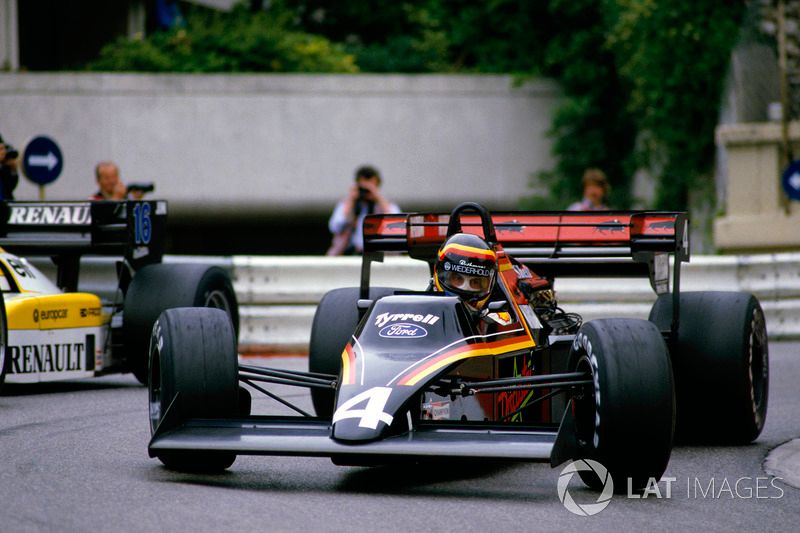
Brundle reckons Bellof was the less wild one when they were Tyrrell team-mates
Photo by: Motorsport Images
Bellof had been told he couldn’t take Pflanzgarten flat, and couldn’t resist the temptation…
Brian Lisles, who engineered Bellof during his time with the Tyrrell Formula 1 squad in 1984-85, reveals that Bellof came clean to him and some team-mates while passengering them around the old ‘Ring.
«He told us that he was going quicker and quicker and that all the engineers had said he shouldn’t go flat over that particular rise,» recalls Lisles.
«Eventually, Stefan did take it flat and took off. He thought it was hugely funny.»
Lisles doesn’t believe that Bellof was a driver who was perpetually on the verge of an accident.
«His driving had a flamboyant air about it, which maybe gave that impression,» he says. «I certainly don’t think he was a crasher.»
Martin Brundle, who was Bellof’s regular F1 team-mate, agrees on that point.
«Wasn’t I the one who kept smashing up Tyrrells?» he says in reference to his Monaco and Dallas shunts in 1984. «Stefan was a bit wild, but not a crasher.»
Those at Porsche during his two-season stint with the factory Rothmans Group C team, which included title success in the 1984 World Endurance Championship, are on the same side of the fence on this one.
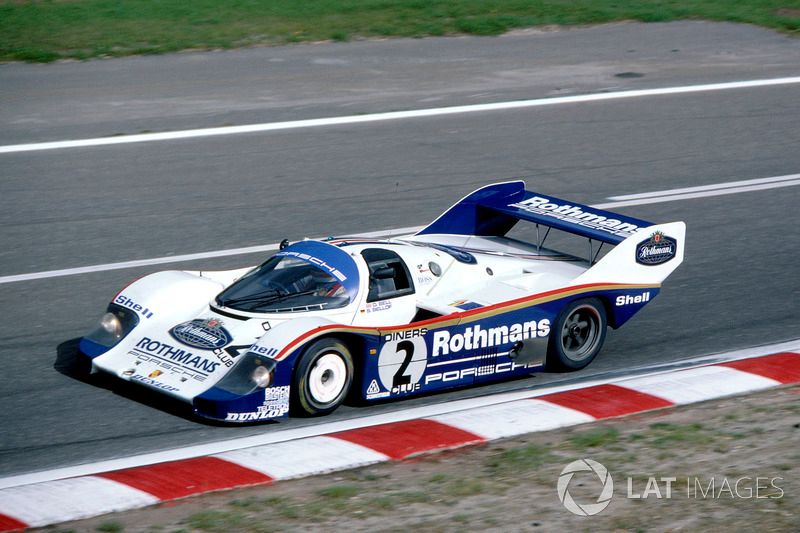
Pictured here in 1983, Bellof won the 1984 World Sportscar title with Porsche
Photo by: Motorsport Images
Singer reckons that Bellof’s reputation has been unfairly tainted by his Nurburgring accident.
«His crash at the ‘Ring was very spectacular and people thought that he was doing it every day,» he says.
«He didn’t crash so much. He knew his limit, which is why he was such a good driver. But he had no fear about going a little bit over it.»
No one who worked with Bellof will tell you that he was anything other than a mega-talent.
Long-time Formula 3 team owner Bertram Schafer gave Bellof the opportunity to take in the second half of the 1981 German series aboard a Toyota-engined RT3 at the same time he was racing in both Formula Ford 1600 and Formula Super Vee with Walter Lechner Racing.
«I’d known Stefan for a couple of years because his brother Georg had already driven for my team,» explains Schafer. «I’d watched him racing quite a few times, so we gave him a test and he was incredible.
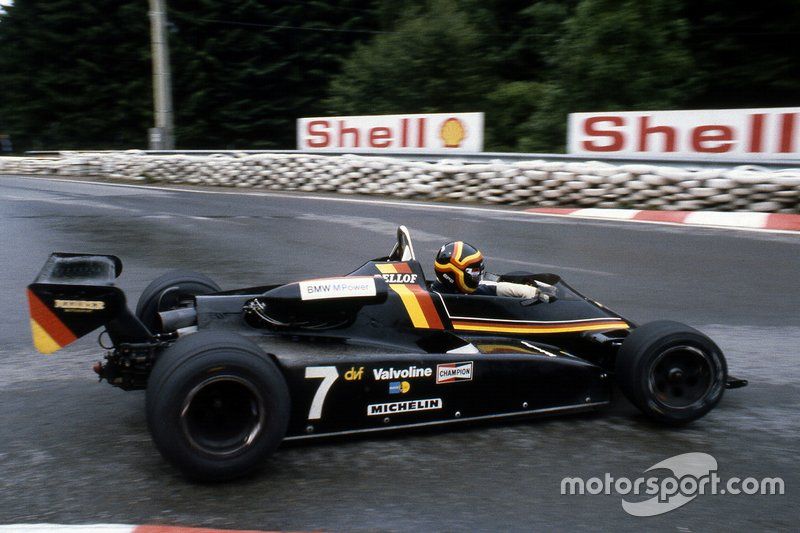
Bellof rapidly earned an F2 chance
Photo by: Motorsport Images
«I didn’t have any doubts that I should take him. The only problem was the financial situation, but we didn’t have any choice but to get him out on track. A team like ours always benefited from the results of a good driver.»
Bellof graduated to Formula 2 with the Maurer team for 1982, and it was Schafer who recommended him to the Anglo-German squad.
«I had been doing F2 on race-by-race deals and had ordered a new Maurer for the following season,» explains Schafer. «I knew I didn’t have the money to run Stefan, so I told Maurer to sign him before anyone else did.»
Bellof famously won the opening two races of his F2 career at Silverstone and Hockenheim, but he’d been impressing the Bolton-based team from the moment he first sat in one of its cars.
«Stefan was such a naturally gifted driver,» remembers Maurer team boss Paul Owens. «He could deal with a lively car, which was perfect in those ground-effect days. He liked a stiffer car than his team-mates, and those cars were better the harder you ran them.
«He had an innate car control and got straight on it whichever circuit we went to. I’ll never forget going to Thruxton and telling him to watch out for the big bump at Church Corner. He came in after his first run, and said, ‘what bump?’. He was that kind of driver.»
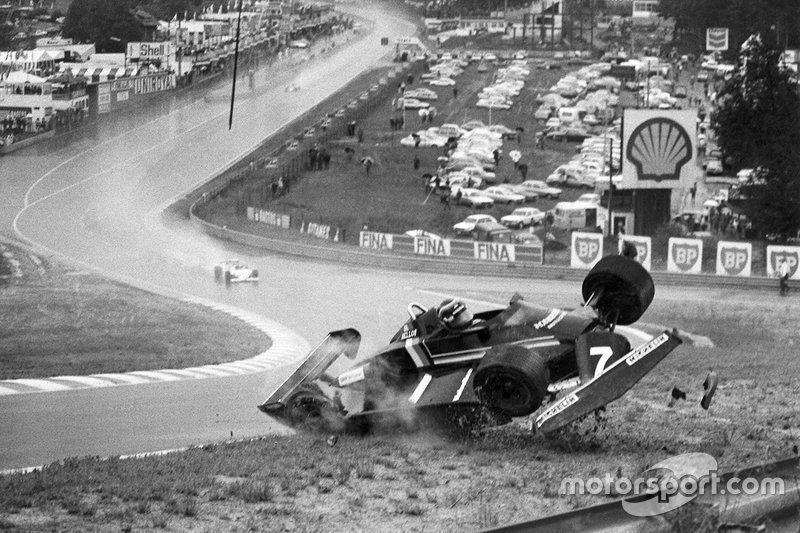
F2 didn’t always go smoothly for Bellof
Photo by: Motorsport Images
Owens, like many others who worked with Bellof during his short career, believes he was destined for greatness.
«He could have gone all the way,» reckons Owens. «But he would have needed a good tutor to channel his talents into continuous results.»
Brundle agrees.
«He would have to have hooked up with a Ross Brawn-type character,» he says. «Stefan was massively fast, but to turn that into real success, he was going to have to apply a lot more control.
«It was entirely feasible that he could have gone on to be a great. But perhaps he was more in the mould of Gilles Villeneuve than Alain Prost.»
It has been suggested that Bellof lacked the technical acumen to make it at the very top of the sport. Singer suggests he wasn’t interested in such things, but Lisles isn’t quite so sure.
«I wouldn’t say he was technically gifted like Ayrton Senna or Prost, though that’s something that comes partly with experience,» he says.
«But I do remember being amazed when he first came to Tyrrell that he was able to reel off the maximum revs on each straight. It was hard enough trying to educate drivers to look at the rev-counter, let alone remember what they saw.

Bellof lost a podium finish in the famously wet 1984 Monaco GP when Tyrrell was disqualified from the championship
Photo by: Sutton Images
«He’d already been racing for Porsche and in many ways had been well-disciplined in a systematic approach to driving a car. He was very disciplined in terms of his feedback.»
Lisle’s defining moment of Bellof’s short career came at the 1984 Monaco Grand Prix. Everyone remembers fellow rookie Senna coming home second to Prost in the shortened race, but the German was lapping faster in third position than both of them aboard his normally aspirated Tyrrell-Cosworth 012.
Senna finished with a bent front suspension arm; Bellof’s car was «unmarked after the race», according to Lisles.
Bellof had overtaken Rene Arnoux’s Ferrari for a third position that would later be expunged from the record books courtesy of Tyrrell’s disqualification from the world championship. This move – into Mirabeau with two wheels up on the kerb – reputedly caught the eye of Enzo Ferrari.
Bellof, who already had a contract with Ferrari sponsor Marlboro for 1985, was about to start talks with the Scuderia. Porsche Motorsport boss Manfred Jantke, who gave him his contract for 1983, remembers his former driver confiding in him about a trip to Fiorano.
«He told me that he had this meeting coming with Ferrari and that he had invited the owner of his favourite pizzeria in Giessen [his home town] to go with him so they could follow what was going on in Italian,» recalls Jantke. «Before the meeting could happen, Stefan was killed.
«I believe that if Stefan had lived, Germany would have experienced the Schumacher miracle 10 or more years early.»
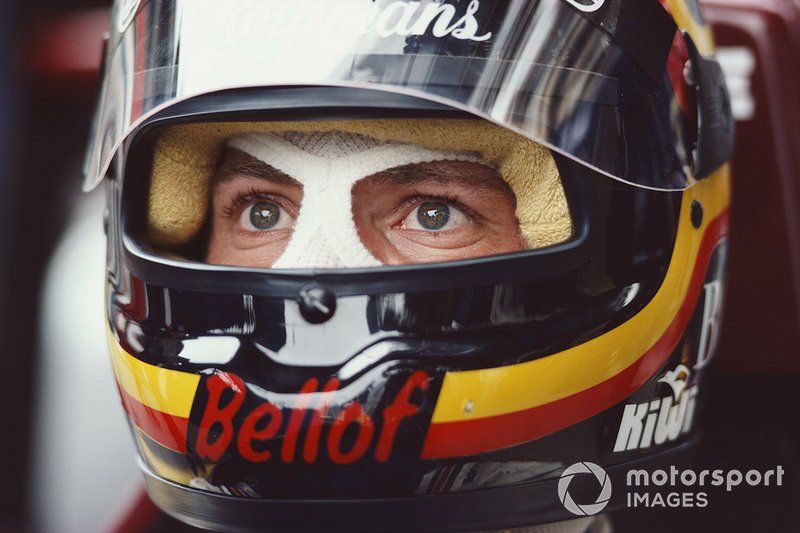
Would Bellof have been Germany’s first F1 champion?
Photo by: Rainer W. Schlegelmilch / Motorsport Images
In this article
Be the first to know and subscribe for real-time news email updates on these topics
Subscribe to news alerts








